NRSG139 Integrating Practice 1: Gibb's Reflective Cycle Reflection
VerifiedAdded on 2022/09/15
|6
|1367
|12
Report
AI Summary
This report presents a student's reflection on their experience with health interviews, focusing on the skills and knowledge gained during the NRSG139 Integrating Practice 1 unit. The student utilizes Gibb's reflective cycle to analyze a specific clinical incident involving a health assessment interview. The reflection covers the description of the experience, the feelings associated with it, an evaluation of both positive and negative aspects, an analysis of the situation, and a conclusion summarizing the learning outcomes. The student identifies challenges in communication, confidence, and adherence to NMBA standards. The action plan outlines steps for improvement, including training, seeking clinical supervision, and practicing communication skills. The report references relevant literature to support the analysis and conclusions, and the student aims to enhance their clinical practice by developing confidence and refining communication skills for future health assessments.
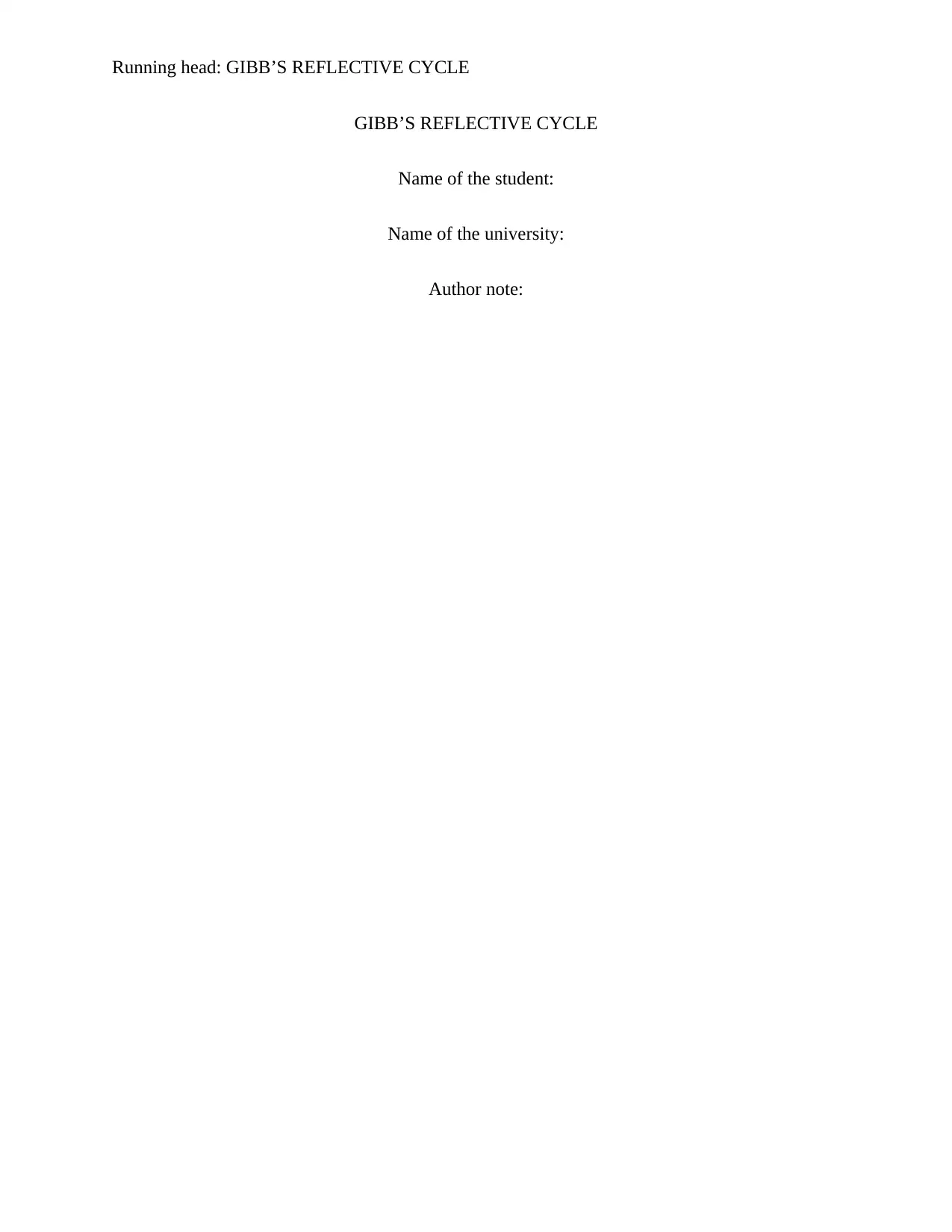
Running head: GIBB’S REFLECTIVE CYCLE
GIBB’S REFLECTIVE CYCLE
Name of the student:
Name of the university:
Author note:
GIBB’S REFLECTIVE CYCLE
Name of the student:
Name of the university:
Author note:
Paraphrase This Document
Need a fresh take? Get an instant paraphrase of this document with our AI Paraphraser
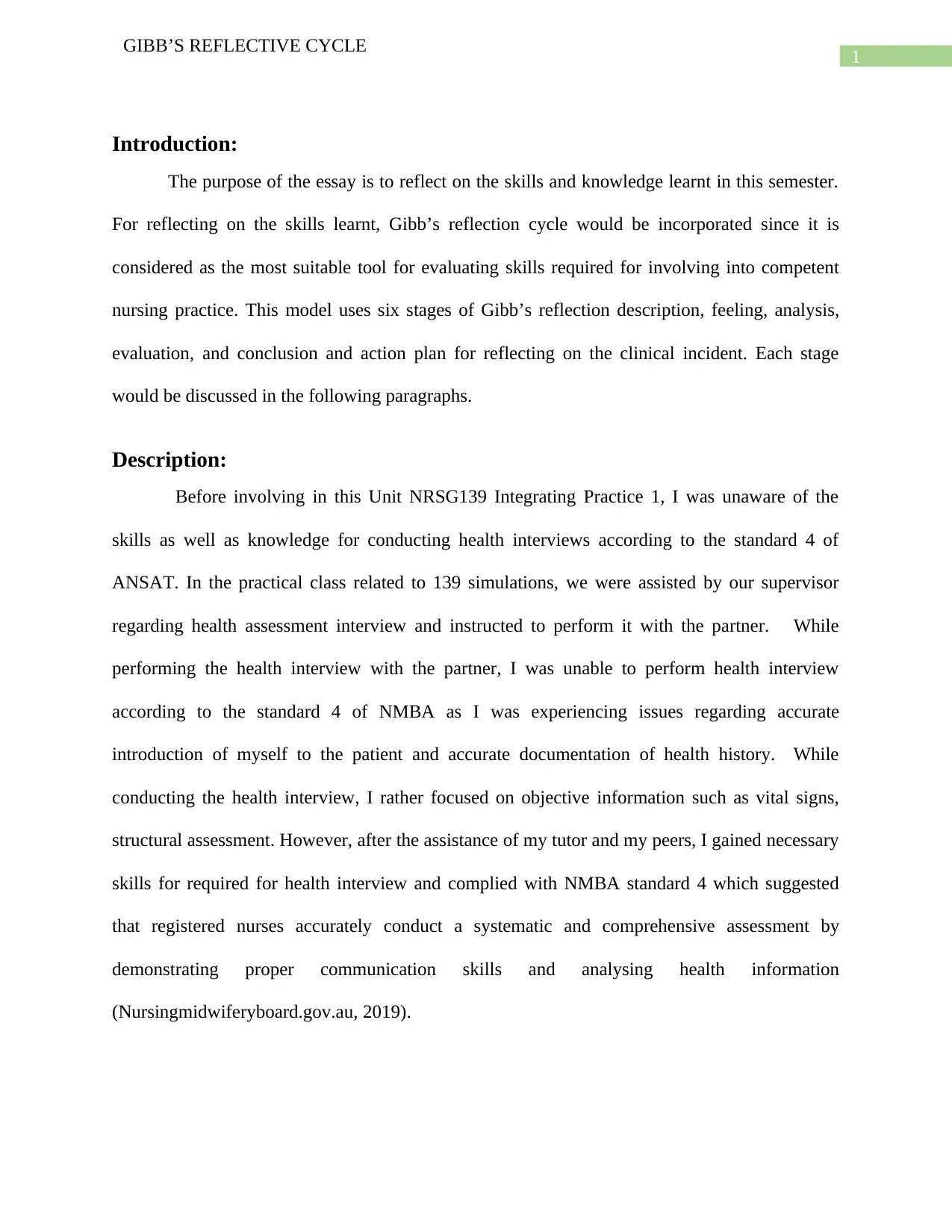
1
GIBB’S REFLECTIVE CYCLE
Introduction:
The purpose of the essay is to reflect on the skills and knowledge learnt in this semester.
For reflecting on the skills learnt, Gibb’s reflection cycle would be incorporated since it is
considered as the most suitable tool for evaluating skills required for involving into competent
nursing practice. This model uses six stages of Gibb’s reflection description, feeling, analysis,
evaluation, and conclusion and action plan for reflecting on the clinical incident. Each stage
would be discussed in the following paragraphs.
Description:
Before involving in this Unit NRSG139 Integrating Practice 1, I was unaware of the
skills as well as knowledge for conducting health interviews according to the standard 4 of
ANSAT. In the practical class related to 139 simulations, we were assisted by our supervisor
regarding health assessment interview and instructed to perform it with the partner. While
performing the health interview with the partner, I was unable to perform health interview
according to the standard 4 of NMBA as I was experiencing issues regarding accurate
introduction of myself to the patient and accurate documentation of health history. While
conducting the health interview, I rather focused on objective information such as vital signs,
structural assessment. However, after the assistance of my tutor and my peers, I gained necessary
skills for required for health interview and complied with NMBA standard 4 which suggested
that registered nurses accurately conduct a systematic and comprehensive assessment by
demonstrating proper communication skills and analysing health information
(Nursingmidwiferyboard.gov.au, 2019).
GIBB’S REFLECTIVE CYCLE
Introduction:
The purpose of the essay is to reflect on the skills and knowledge learnt in this semester.
For reflecting on the skills learnt, Gibb’s reflection cycle would be incorporated since it is
considered as the most suitable tool for evaluating skills required for involving into competent
nursing practice. This model uses six stages of Gibb’s reflection description, feeling, analysis,
evaluation, and conclusion and action plan for reflecting on the clinical incident. Each stage
would be discussed in the following paragraphs.
Description:
Before involving in this Unit NRSG139 Integrating Practice 1, I was unaware of the
skills as well as knowledge for conducting health interviews according to the standard 4 of
ANSAT. In the practical class related to 139 simulations, we were assisted by our supervisor
regarding health assessment interview and instructed to perform it with the partner. While
performing the health interview with the partner, I was unable to perform health interview
according to the standard 4 of NMBA as I was experiencing issues regarding accurate
introduction of myself to the patient and accurate documentation of health history. While
conducting the health interview, I rather focused on objective information such as vital signs,
structural assessment. However, after the assistance of my tutor and my peers, I gained necessary
skills for required for health interview and complied with NMBA standard 4 which suggested
that registered nurses accurately conduct a systematic and comprehensive assessment by
demonstrating proper communication skills and analysing health information
(Nursingmidwiferyboard.gov.au, 2019).
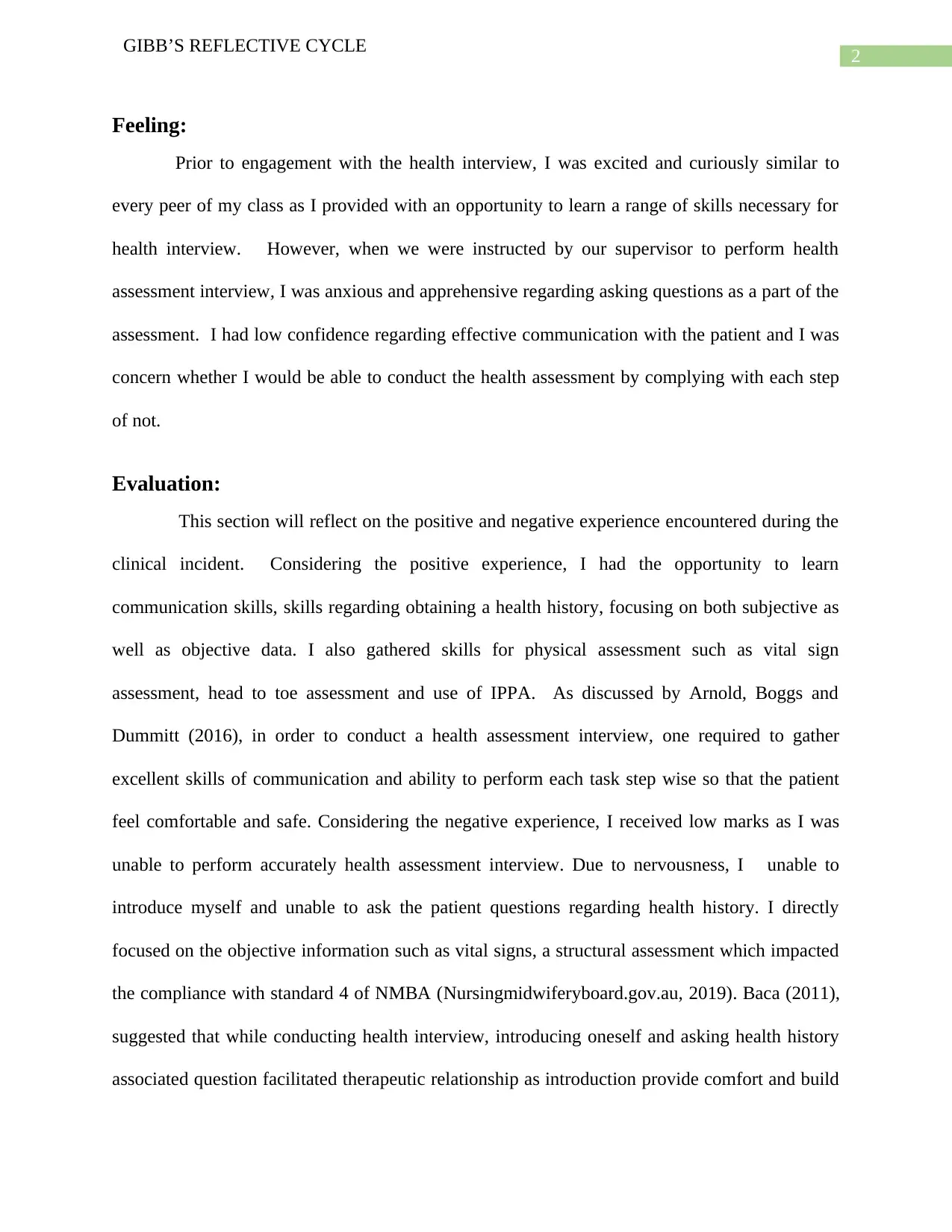
2
GIBB’S REFLECTIVE CYCLE
Feeling:
Prior to engagement with the health interview, I was excited and curiously similar to
every peer of my class as I provided with an opportunity to learn a range of skills necessary for
health interview. However, when we were instructed by our supervisor to perform health
assessment interview, I was anxious and apprehensive regarding asking questions as a part of the
assessment. I had low confidence regarding effective communication with the patient and I was
concern whether I would be able to conduct the health assessment by complying with each step
of not.
Evaluation:
This section will reflect on the positive and negative experience encountered during the
clinical incident. Considering the positive experience, I had the opportunity to learn
communication skills, skills regarding obtaining a health history, focusing on both subjective as
well as objective data. I also gathered skills for physical assessment such as vital sign
assessment, head to toe assessment and use of IPPA. As discussed by Arnold, Boggs and
Dummitt (2016), in order to conduct a health assessment interview, one required to gather
excellent skills of communication and ability to perform each task step wise so that the patient
feel comfortable and safe. Considering the negative experience, I received low marks as I was
unable to perform accurately health assessment interview. Due to nervousness, I unable to
introduce myself and unable to ask the patient questions regarding health history. I directly
focused on the objective information such as vital signs, a structural assessment which impacted
the compliance with standard 4 of NMBA (Nursingmidwiferyboard.gov.au, 2019). Baca (2011),
suggested that while conducting health interview, introducing oneself and asking health history
associated question facilitated therapeutic relationship as introduction provide comfort and build
GIBB’S REFLECTIVE CYCLE
Feeling:
Prior to engagement with the health interview, I was excited and curiously similar to
every peer of my class as I provided with an opportunity to learn a range of skills necessary for
health interview. However, when we were instructed by our supervisor to perform health
assessment interview, I was anxious and apprehensive regarding asking questions as a part of the
assessment. I had low confidence regarding effective communication with the patient and I was
concern whether I would be able to conduct the health assessment by complying with each step
of not.
Evaluation:
This section will reflect on the positive and negative experience encountered during the
clinical incident. Considering the positive experience, I had the opportunity to learn
communication skills, skills regarding obtaining a health history, focusing on both subjective as
well as objective data. I also gathered skills for physical assessment such as vital sign
assessment, head to toe assessment and use of IPPA. As discussed by Arnold, Boggs and
Dummitt (2016), in order to conduct a health assessment interview, one required to gather
excellent skills of communication and ability to perform each task step wise so that the patient
feel comfortable and safe. Considering the negative experience, I received low marks as I was
unable to perform accurately health assessment interview. Due to nervousness, I unable to
introduce myself and unable to ask the patient questions regarding health history. I directly
focused on the objective information such as vital signs, a structural assessment which impacted
the compliance with standard 4 of NMBA (Nursingmidwiferyboard.gov.au, 2019). Baca (2011),
suggested that while conducting health interview, introducing oneself and asking health history
associated question facilitated therapeutic relationship as introduction provide comfort and build
⊘ This is a preview!⊘
Do you want full access?
Subscribe today to unlock all pages.

Trusted by 1+ million students worldwide
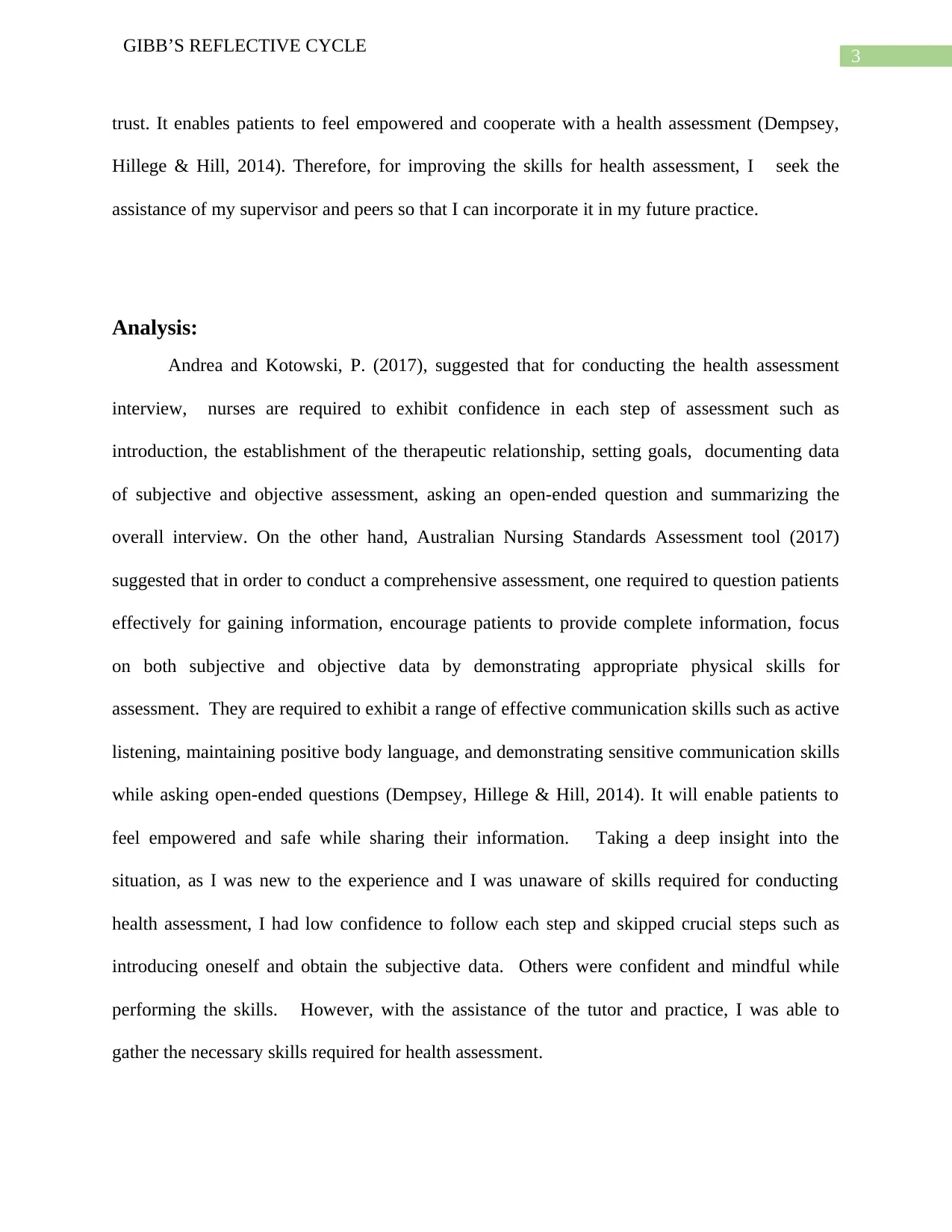
3
GIBB’S REFLECTIVE CYCLE
trust. It enables patients to feel empowered and cooperate with a health assessment (Dempsey,
Hillege & Hill, 2014). Therefore, for improving the skills for health assessment, I seek the
assistance of my supervisor and peers so that I can incorporate it in my future practice.
Analysis:
Andrea and Kotowski, P. (2017), suggested that for conducting the health assessment
interview, nurses are required to exhibit confidence in each step of assessment such as
introduction, the establishment of the therapeutic relationship, setting goals, documenting data
of subjective and objective assessment, asking an open-ended question and summarizing the
overall interview. On the other hand, Australian Nursing Standards Assessment tool (2017)
suggested that in order to conduct a comprehensive assessment, one required to question patients
effectively for gaining information, encourage patients to provide complete information, focus
on both subjective and objective data by demonstrating appropriate physical skills for
assessment. They are required to exhibit a range of effective communication skills such as active
listening, maintaining positive body language, and demonstrating sensitive communication skills
while asking open-ended questions (Dempsey, Hillege & Hill, 2014). It will enable patients to
feel empowered and safe while sharing their information. Taking a deep insight into the
situation, as I was new to the experience and I was unaware of skills required for conducting
health assessment, I had low confidence to follow each step and skipped crucial steps such as
introducing oneself and obtain the subjective data. Others were confident and mindful while
performing the skills. However, with the assistance of the tutor and practice, I was able to
gather the necessary skills required for health assessment.
GIBB’S REFLECTIVE CYCLE
trust. It enables patients to feel empowered and cooperate with a health assessment (Dempsey,
Hillege & Hill, 2014). Therefore, for improving the skills for health assessment, I seek the
assistance of my supervisor and peers so that I can incorporate it in my future practice.
Analysis:
Andrea and Kotowski, P. (2017), suggested that for conducting the health assessment
interview, nurses are required to exhibit confidence in each step of assessment such as
introduction, the establishment of the therapeutic relationship, setting goals, documenting data
of subjective and objective assessment, asking an open-ended question and summarizing the
overall interview. On the other hand, Australian Nursing Standards Assessment tool (2017)
suggested that in order to conduct a comprehensive assessment, one required to question patients
effectively for gaining information, encourage patients to provide complete information, focus
on both subjective and objective data by demonstrating appropriate physical skills for
assessment. They are required to exhibit a range of effective communication skills such as active
listening, maintaining positive body language, and demonstrating sensitive communication skills
while asking open-ended questions (Dempsey, Hillege & Hill, 2014). It will enable patients to
feel empowered and safe while sharing their information. Taking a deep insight into the
situation, as I was new to the experience and I was unaware of skills required for conducting
health assessment, I had low confidence to follow each step and skipped crucial steps such as
introducing oneself and obtain the subjective data. Others were confident and mindful while
performing the skills. However, with the assistance of the tutor and practice, I was able to
gather the necessary skills required for health assessment.
Paraphrase This Document
Need a fresh take? Get an instant paraphrase of this document with our AI Paraphraser
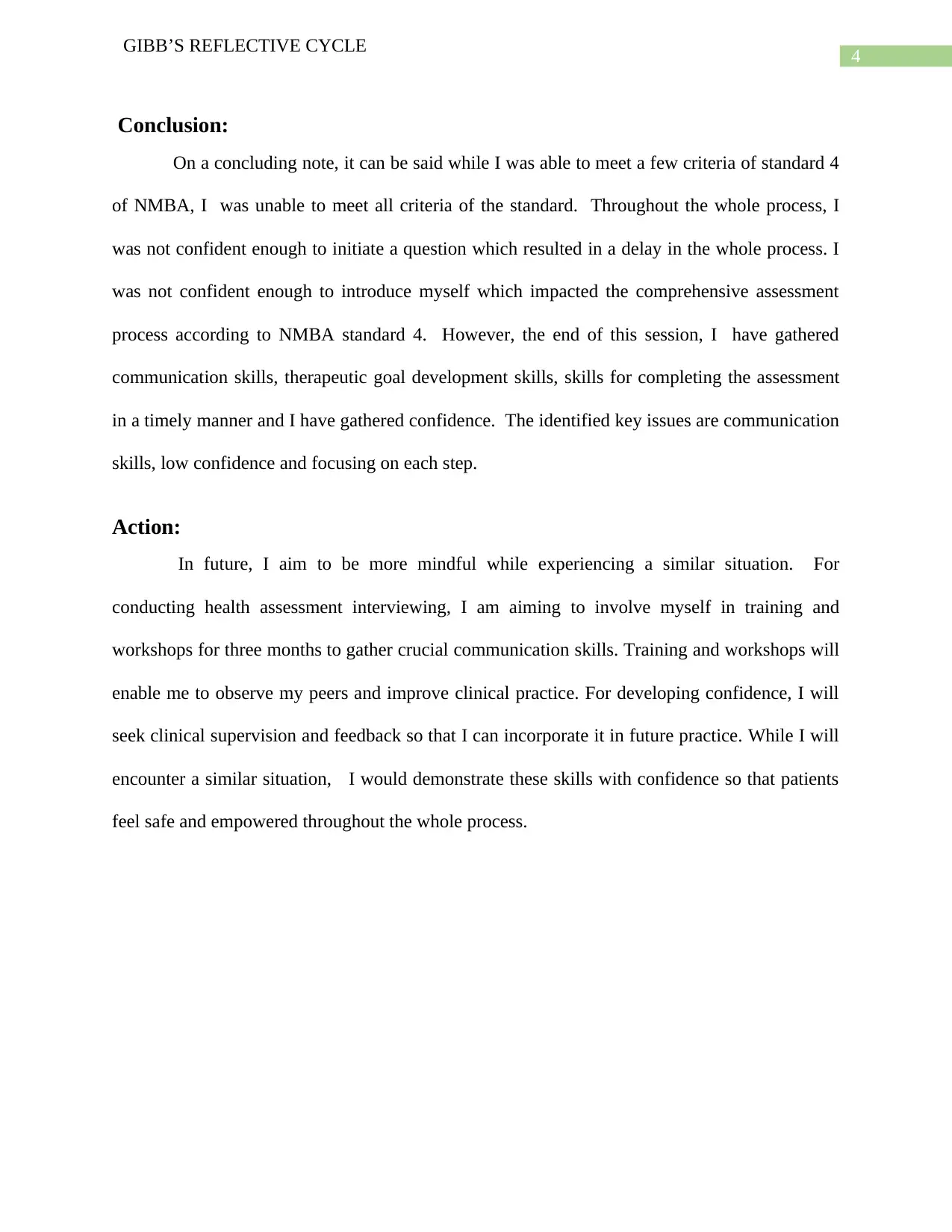
4
GIBB’S REFLECTIVE CYCLE
Conclusion:
On a concluding note, it can be said while I was able to meet a few criteria of standard 4
of NMBA, I was unable to meet all criteria of the standard. Throughout the whole process, I
was not confident enough to initiate a question which resulted in a delay in the whole process. I
was not confident enough to introduce myself which impacted the comprehensive assessment
process according to NMBA standard 4. However, the end of this session, I have gathered
communication skills, therapeutic goal development skills, skills for completing the assessment
in a timely manner and I have gathered confidence. The identified key issues are communication
skills, low confidence and focusing on each step.
Action:
In future, I aim to be more mindful while experiencing a similar situation. For
conducting health assessment interviewing, I am aiming to involve myself in training and
workshops for three months to gather crucial communication skills. Training and workshops will
enable me to observe my peers and improve clinical practice. For developing confidence, I will
seek clinical supervision and feedback so that I can incorporate it in future practice. While I will
encounter a similar situation, I would demonstrate these skills with confidence so that patients
feel safe and empowered throughout the whole process.
GIBB’S REFLECTIVE CYCLE
Conclusion:
On a concluding note, it can be said while I was able to meet a few criteria of standard 4
of NMBA, I was unable to meet all criteria of the standard. Throughout the whole process, I
was not confident enough to initiate a question which resulted in a delay in the whole process. I
was not confident enough to introduce myself which impacted the comprehensive assessment
process according to NMBA standard 4. However, the end of this session, I have gathered
communication skills, therapeutic goal development skills, skills for completing the assessment
in a timely manner and I have gathered confidence. The identified key issues are communication
skills, low confidence and focusing on each step.
Action:
In future, I aim to be more mindful while experiencing a similar situation. For
conducting health assessment interviewing, I am aiming to involve myself in training and
workshops for three months to gather crucial communication skills. Training and workshops will
enable me to observe my peers and improve clinical practice. For developing confidence, I will
seek clinical supervision and feedback so that I can incorporate it in future practice. While I will
encounter a similar situation, I would demonstrate these skills with confidence so that patients
feel safe and empowered throughout the whole process.
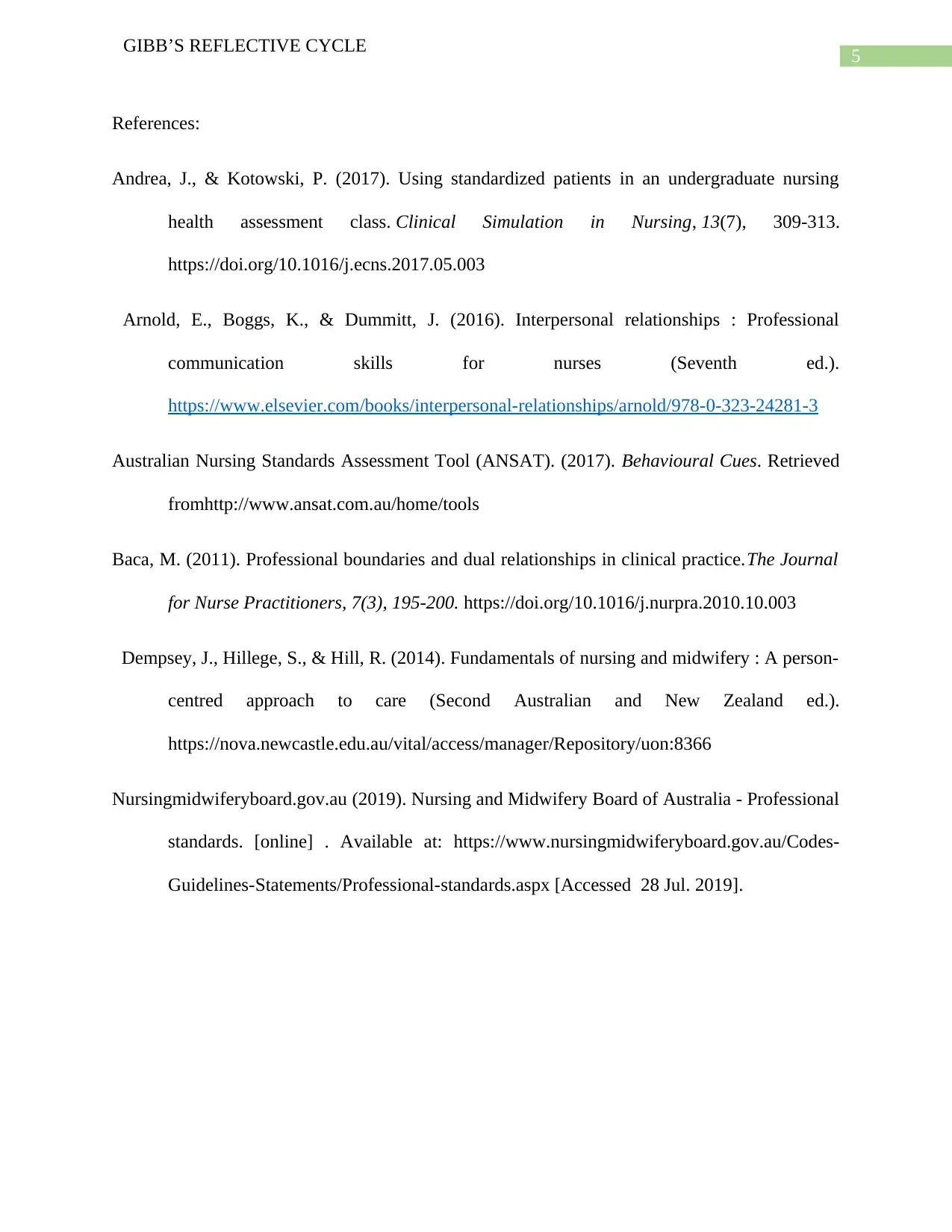
5
GIBB’S REFLECTIVE CYCLE
References:
Andrea, J., & Kotowski, P. (2017). Using standardized patients in an undergraduate nursing
health assessment class. Clinical Simulation in Nursing, 13(7), 309-313.
https://doi.org/10.1016/j.ecns.2017.05.003
Arnold, E., Boggs, K., & Dummitt, J. (2016). Interpersonal relationships : Professional
communication skills for nurses (Seventh ed.).
https://www.elsevier.com/books/interpersonal-relationships/arnold/978-0-323-24281-3
Australian Nursing Standards Assessment Tool (ANSAT). (2017). Behavioural Cues. Retrieved
fromhttp://www.ansat.com.au/home/tools
Baca, M. (2011). Professional boundaries and dual relationships in clinical practice.The Journal
for Nurse Practitioners, 7(3), 195-200. https://doi.org/10.1016/j.nurpra.2010.10.003
Dempsey, J., Hillege, S., & Hill, R. (2014). Fundamentals of nursing and midwifery : A person-
centred approach to care (Second Australian and New Zealand ed.).
https://nova.newcastle.edu.au/vital/access/manager/Repository/uon:8366
Nursingmidwiferyboard.gov.au (2019). Nursing and Midwifery Board of Australia - Professional
standards. [online] . Available at: https://www.nursingmidwiferyboard.gov.au/Codes-
Guidelines-Statements/Professional-standards.aspx [Accessed 28 Jul. 2019].
GIBB’S REFLECTIVE CYCLE
References:
Andrea, J., & Kotowski, P. (2017). Using standardized patients in an undergraduate nursing
health assessment class. Clinical Simulation in Nursing, 13(7), 309-313.
https://doi.org/10.1016/j.ecns.2017.05.003
Arnold, E., Boggs, K., & Dummitt, J. (2016). Interpersonal relationships : Professional
communication skills for nurses (Seventh ed.).
https://www.elsevier.com/books/interpersonal-relationships/arnold/978-0-323-24281-3
Australian Nursing Standards Assessment Tool (ANSAT). (2017). Behavioural Cues. Retrieved
fromhttp://www.ansat.com.au/home/tools
Baca, M. (2011). Professional boundaries and dual relationships in clinical practice.The Journal
for Nurse Practitioners, 7(3), 195-200. https://doi.org/10.1016/j.nurpra.2010.10.003
Dempsey, J., Hillege, S., & Hill, R. (2014). Fundamentals of nursing and midwifery : A person-
centred approach to care (Second Australian and New Zealand ed.).
https://nova.newcastle.edu.au/vital/access/manager/Repository/uon:8366
Nursingmidwiferyboard.gov.au (2019). Nursing and Midwifery Board of Australia - Professional
standards. [online] . Available at: https://www.nursingmidwiferyboard.gov.au/Codes-
Guidelines-Statements/Professional-standards.aspx [Accessed 28 Jul. 2019].
⊘ This is a preview!⊘
Do you want full access?
Subscribe today to unlock all pages.

Trusted by 1+ million students worldwide
1 out of 6
Related Documents
Your All-in-One AI-Powered Toolkit for Academic Success.
+13062052269
info@desklib.com
Available 24*7 on WhatsApp / Email
![[object Object]](/_next/static/media/star-bottom.7253800d.svg)
Unlock your academic potential
Copyright © 2020–2026 A2Z Services. All Rights Reserved. Developed and managed by ZUCOL.




